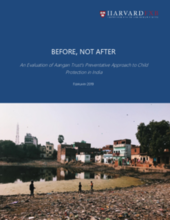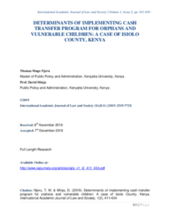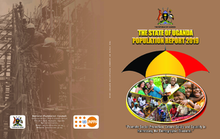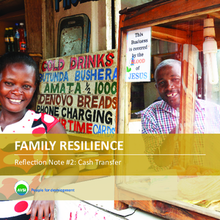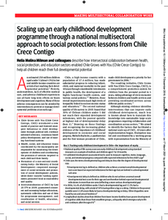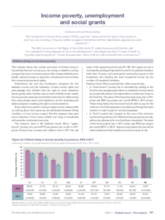Displaying 101 - 110 of 461
This study documents and evaluates the harm prevention work carried out by the children’s rights nonprofit Aangan Trust since late 2015 in Konia, a peri-urban slum area in Varanasi, a large city in the Indian state of Uttar Pradesh.
The study was guided by three objectives to; examine the influence of financial resources in the implementation of Cash Transfer program for Orphans and Vulnerable Children, determine how management influences the implementation of Cash Transfer program for Orphans and Vulnerable Children, examine the influence of stakeholders in the implementation of Cash Transfer program for Orphans and Vulnerable Children in Isiolo county.
The State of Uganda Population Report 2019 shows the potential of social protection systems to promote inclusive development that leaves no one behind—to reduce poverty, inequality and promote social inclusion.
This Reflection Note is intended as a means for AVSI staff and implementing partners on the FARE project to capture emerging learning as relates to the theory of change elaborated during project design. Particularly, the Reflection Note seeks to answer how necessary and effective cash transfers are as a component of the economic strengthening pathway, hypothesized as crucial for the project goals of building family resilience as a means of preventing child-family separation or ensuring successful reintegration of children into family care.
This study sought to examine social protection mechanisms for children living on the streets of Uganda, a case study of Kampala.
The purpose of this paper is to explore the wider context in which the UK national evaluation of the Adoption Support Fund (ASF) was delivered and raise concerns about the sustainability of the early outcomes.
This article describes how intersectoral collaboration between health, social protection, and education sectors enabled Chile Grows with You (Chile Crece Contigo) to help all children reach their full developmental potential.
This qualitative study sought to explore the perspectives of a group of South African caregivers, all of whom were in receipt of a Child Support Grant (CSG), in relation to their own caregiving and family functioning.
This article suggests that financial supports for adoption could be extended by introducing Child Development Accounts for children adopted from foster care in New South Wales, Australia.
This chapter from the South African Child Gauge 2018 provides an overview of children living in poverty in South Africa, highlighting those living in households without an employed adult.

